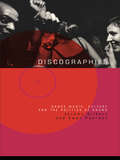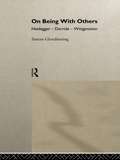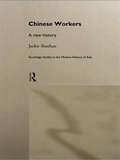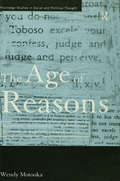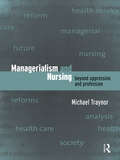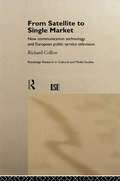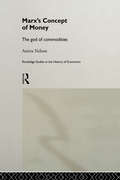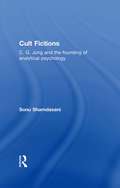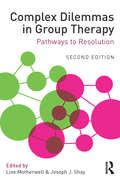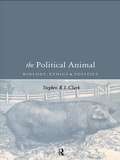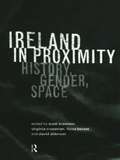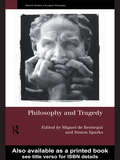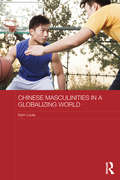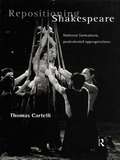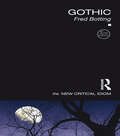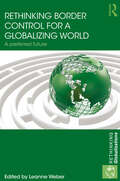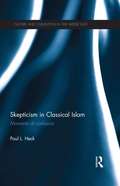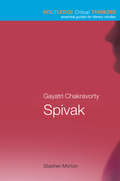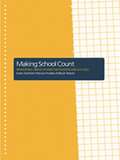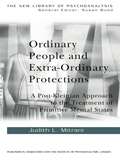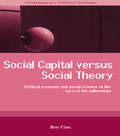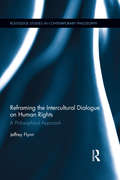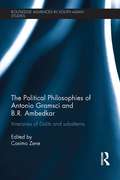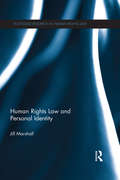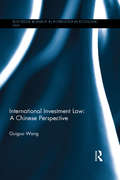Special Collections
Benetech’s Global Certified Accessible Titles
Description: Benetech’s GCA program is the first independent third-party EPUB certification to verify ebook accessibility. By creating content that is born accessible, publishers can meet the needs of all readers. Learn more: https://bornaccessible.benetech.org/
- Table View
- List View
Discographies
by Jeremy Gilbert and Ewan PearsonExperiencing disco, hip hop, house, techno, drum 'n' bass and garage, Discographies plots a course through the transatlantic dance scene of the last last twenty-five years. It discusses the problems posed by contemporary dance culture of both academic and cultural study and finds these origins in the history of opposition to music as a source of sensory pleasure.Discussing such issues as technology, club space. drugs, the musical body, gender, sexuality and pleasure, Discographies explores the ecstatic experiences at the heart of contemporary dance culture. It suggests why politicians and agencies as diverse as the independent music press and public broadcasting should be so hostile to this cultural phenomenon.
On Being With Others
by Simon GlendinningOn Being With Others is an outstanding exploration of this key philosophical question. Simon Glendinning shows how traditional positions in the philosophy of mind can do little to rebuff the accusation that in fact we have little claim to have knowledge of minds other than our own.On Being With Others sets out to refute this charge and disentangle many of the confusions in contemporary philosophy of mind and language that have led to such scepticism. Simon Glendinning explores why early attempts by J.L. Austin and Martin Heidegger to refute scepticism about other minds failed and argues that we must turn to Wittgenstein in order to build a solid theory of other minds. Drawing on the celebrated debate between John Searle and Jacques Derrida, Simon Glendinning establishes fascinating and important links between controversies in the philosophy of mind, language and epistemology.
Chinese Workers
by Jackie SheehanJackie Sheehan traces the background and development of workers clashes with the Chinese Communist Party through mass campaigns such as the 1956-7 Hundred Flowers movement, the Cultural Revolution, the April Fifth Movement of 1976, Democracy Wall and the 1989 Democracy Movement. The author provides the most detailed and complete picture of workers protest in China to date and locates their position within the context of Chinese political history. Chinese Workers demonstrates that the image of Chinese workers as politically conformist and reliable supporters of the Communist Party does not match the realities of industrial life in China. Recent outbreaks of protest by workers are less of a departure from the past than is generally realized.
The Age of Reasons
by Wendy MotookaWendy Motooka contends that 'the Age of Reason' was actually an Age of Reasons. Joining imaginative literature, moral philosophy, and the emerging discourse of the new science, she seeks to historicise the meaning of eighteenth-century 'reason' and its supposed opposites, quixotism and sentimentalism. Reading novels by the Fieldings, Lennox and Sterne alongside the works of Adam Smith, Motooka argues that the legacy of sentimentalism is the social sciences. This book raises our understanding of eighteenth-century British culture and its relation to the 'rational' culture of economics that is growing ever more prevasive today.
Managerialism and Nursing
by Michael TraynorManagerialism and Nursing examines the effect of new management strategies on nurses, their morale and the profession as a whole. Using an innovative study of nurses conducted by the Royal College of Nursing, Michael Traynor analyses the relationship between nurses and their managers, looking at the contrasting ways in which each group argues its case and presents its identity.Managerialism and Nursing will be stimulating reading for anyone interested in the future of the health service and also serves as a highly readably introduction to postmodern approaches to analysis.
From Satellite to Single Market
by Richard CollinsRichard Collins explores public service television's role in fostering pan-European cultural identity. Based on extensive primary research, interviews with participants and analysis of key European programmes, this book documents the growth of the public service satellite television network which was backed by the European Union, and its eventual alliance with Rupert Murdoch's commercial Sky network.
Marx's Concept of Money
by Anitra NelsonThis work relates Marx's theory of money to his overall political economy, and places it firmly within the wider context of his political and philosophical thought. It has for some time been held that there exists an epistomological break between the early 'humanist' and later 'scientific' Marx. However, in this ground-breaking study Anitra Nelson links Marx's conecept of money to his early key concepts with particular reference to 'alienation'.
Cult Fictions
by Sonu ShamdasaniControversial claims that C.G. Jung, founder of analytical psychology, was a charlatan and a self-appointed demi-god have recently brought his legacy under renewed scrutiny. The basis of the attack on Jung is a previously unknown text, said to be Jung's inaugural address at the founding of his 'cult', otherwise known as the Psychological Club, in Zurich in 1916. It is claimed that this cult is alive and well in Jungian psychology as it is practised today, in a movement which continues to masquerade as a genuine professional discipline, whilst selling false dreams of spiritual redemption. In Cult Fictions, leading Jung scholar Sonu Shamdasani looks into the evidence for such claims and draws on previously unpublished documents to show that they are fallacious. This accurate and revealing account of the history of the Jungian movement, from the founding of the Psychological Club to the reformulation of Jung's approach by his followers, establishes a fresh agenda for the historical evaluation of analytical psychology today.
Complex Dilemmas in Group Therapy
by Joseph J. Shay and Lise MotherwellGroup work presents the therapist with many situations, considerations, and, ultimately, decisions that are unique to the practice of group psychotherapy. The second edition of Complex Dilemmas in Group Therapy includes advice and insights from more than fifty of the most eminent group therapists in the world and is edited by two leading thinkers and practitioners in the field. In its pages clinicians will find expert guidance on some of the most difficult situations group therapists face, and they'll come away from the book with a host of practical strategies for facilitating their work as well as deeper and broader understanding of the overarching ideas that underpin the practice of successful group therapy.
The Political Animal
by Stephen R Clark and Stephen R.L ClarkPeople, as Aristotle said, are political animals. Mainstream political philosophy, however, has largely neglected humankind's animal nature as beings who are naturally equipped, and inclined, to reason and work together, create social bonds and care for their young. Stephen Clark, grounded in biological analysis and traditional ethics, probes into areas ignored in mainstream political theory and argues for the significance of social bonds which bypass or transcend state authority. Understanding the ties that bind us reveals how enormously capable we are in achieving civil order as a species. Stephen Clark advocates that a properly informed political philosophy must take into account the role of women, children, animals, minorities and the domestic virtues at large. Living and comnducting our political lives like the animals we are is a more congenial prospect than is usually supposed.
Ireland in Proximity
by David Alderson and Scott Brewster and Virginia Crossman and Fiona BecketIreland in Proximity surveys and develops the expanding field of Irish Studies, reviewing existing debates within the discipline and providing new avenues for exploration. Drawing on a variety of disciplinary and theoretical approaches, this impressive collection of essays makes an innovative contribution to three areas of current, and often contentious, debate within Irish Studies. This accessible volume illustrates the diversity of thinking on Irish history, culture and identity. By invoking theoretical perspectives including psychoanalysis, cultural theories of space, postcoloniality and theories of gender and sexual difference, the collection offers fresh perspectives on established subjects and brings new and under-represented areas of critical concern to the fore. Chapter subjects include: * sexuality and gender identities * the historiographical issues surrounding the Famine * the Irish diaspora * theories of space in relation to Ulster and beyond. Contributors inlcude: David Alderson, Aidan Arrowsmith, Caitriona Beaumont, Fiona Becket, Scott Brewster, Dan Baron Cohen, Mary Corcoran, Virginia Crossman, Richard Kirkland, David Lloyd, Patrick McNally, Elisabeth Mahoney, Willy Maley, Shaun Richards, Éibhear Walshe.
Philosophy and Tragedy
by Miguel De Beistegui and Simon SparksFrom Plato's Republic and Aristotle's Poetics to Nietzsche's The Birth of Tragedy, the theme of tragedy has been subject to radically conflicting philosophical interpretations. Despite being at the heart of philosophical debate from Ancient Greece to the Nineteenth Century, however, tragedy has yet to receive proper treatment as a philosophical tradition in its own right. Philosophy and Tragedy is a compelling contribution to that oversight and the first book to address the topic in a major way. Eleven new essays by internationally renowned philosophers clearly show how time and again, major thinkers have returned to tragedy in many of their key works. Philosophy and Tragedy aks why it is that thinkers as far apart as Hegel and Benjamin should make tragedy such an important theme in their work, and why, after Kant, an important strand of philosophy should present itself tragically. From Heidegger's reading of Sophocles' Antigone to Nietzsche and Benjamin's book-length studies of tragedy, Philosophy and Tragedy presents an outstanding and original study of this preoccupation. The five sections are organised clearly around five major philosophers: Hegel, Holderlin, Nietzsche, Heidegger, and Benjamin
Chinese Masculinities in a Globalizing World
by Kam LouieThis book explores how the traditional ideal of Chinese manhood – the "wen" (cultural attainment) and "wu" (martial prowess) dyad – has been transformed by the increasing integration of China in the international scene. It discusses how increased travel and contact between China and the West are having a profound impact; showing how increased interchange with Western men, for whom "wu" is a more significant ideal, has shifted the balance in the classic Chinese dichotomy; and how the huge emphasis on wealth creation in contemporary China has changed the notion of "wen" itself to include business management skills and monetary power. The book also considers the implications of Chinese "soft power" outside China for the reconfigurations in masculinity ideals in the global setting. The rising significance of Chinese culture enables Chinese cultural norms, including ideals of manhood, to be increasingly integrated in the international sphere and to become hybridised. The book also examines the impact of the Japanese and Korean waves on popular conceptions of desirable manhood in China. Overall, it demonstrates that social constructions of Chinese masculinity have changed more fundamentally and become more global in the last three decades than any other time in the last three thousand years.
Repositioning Shakespeare
by Thomas CartelliRepositioning Shakespeare offers an original assessment of a broad range of texts and cultural events that appropriate Shakespeare. Examining these materials within the context of 'the nation' in a postcolonial era, Thomas Cartelli considers: * essays by Walt Whitman * the nineteenth-century play, 'Jack Cade' * novels by Aphra Behn, Ngugi Wa Thiong'o, Michelle Cliff, Tayeb Salih, Nadine Gordimer and Robert Stone * the 1849 Astor Place Riot Cartelli places particular emphasis on redefining the 'postcolonial' in order to find a place for America. In doing so, Repositioning Shakespeare makes a considerable contribution to the continuing debate about the uses we make of Shakespeare.
Gothic
by Fred BottingThis enduringly popular book has become a classic in the expanding and increasingly popular field of Gothic Studies. This long awaited new edition contains a new chapter on ‘Contemporary Gothic’, an expanded section on American Gothic and more discussion of the gothic in women’s film and writing throughout the book. It is also updated in relation to media and technology with further discussion of stage sensations and photography as well as engaging with all major texts and criticism since initial publication in 1995. With the added benefit of series features such as a glossary and annotated further reading section, this remains the ideal guide to the Gothic.
Rethinking Border Control for a Globalizing World
by Leanne WeberThis book provides a new point of departure for thinking critically and creatively about international borders and the perceived need to defend them, adopting an innovative ‘preferred future’ methodology. The authors critically examine a range of ‘border domains’ including law, citizenship, governance, morality, security, economy, culture and civil society, which provide the means and justification for contemporary border controls, and identify early signs that the dynamics of sovereignty and borders are being fundamentally transformed under conditions of neoliberal globalization. The goal is to locate potential pathways towards the preferred future of relaxed borders, and provide a foundation for a progressive politics dedicated to moving beyond mere critique of the harm and inequity of border controls and capable of envisaging a differently bordered world. This book will be of considerable interest to students of border studies, migration, criminology, peacemaking, critical security studies and IR in general.
Skepticism in Classical Islam
by Paul L. HeckThe first major treatment of skepticism in Islam, this book explores the critical role of skeptical thinking in the development of theology in Islam. It examines the way key thinkers in classical Islam faced perplexing questions about the nature of God and his relation to the world, all the while walking a fine line between belief in God’s message as revealed in the Qur’an, and the power of the mind to discover truths on its own. Skepticism in Classical Islam reveals how doubt was actually an integral part of scholarly life at this time. Skepticism is by no means synonymous with atheism. It is, rather, the admission that one cannot convincingly demonstrate a truth claim with certainty, and Islam’s scholars, like their counterparts elsewhere, acknowledged such impasses, only to be inspired to find new ways to resolve the conundrums they faced. Whilst their conundrums were unique, their admission of the limits of knowledge shares much with other scholarly traditions. Seeking to put Islam on the map of the broader study of the history of scepticism, this book will be of interest to scholars and students of Religion, History and Philosophy.
Gayatri Chakravorty Spivak
by Stephen MortonGayatri Chakravorty Spivak offers an overtly political challenge to the way we think about literature and culture. As she highlights the many legacies of colonialism, she re-defines the ethical horizons of contemporary critical thought. This volume focuses on her key theoretical concepts, intellectual context and critical reception, providing an accessible introduction to one of the most important thinkers of our time.Stephen Morton introduces Spivak's crucial work through an analysis of such issues as:* methodology and Spivak's 'difficult' style* deconstructive strategies* third world women, the concept of the 'subaltern' and the critique of western feminism* re-reading Marx for the global capitalist era* Spivak's contribution to colonial discourse studies and postcolonial theory.Having examined the ways in which Spivak has transformed contemporary cultural theory, and in particular feminist and postcolonial thought, Morton concludes with a guide to reading Spivak's work and that of her critics. Essential for students of literature or cultural studies, this volume is the ideal companion for a first encounter with Spivak's remarkable texts.
Making School Count
by Andrea Debruin-Parecki and Karen Manheim TeelMaking School Count reports on four years of classroom research in which alternative teaching strategies, designed to motivate under-achieving inner-city, African-American middle school students were used and evaluated. The book offers insights into the discrepancy between students' academic dreams (their high performance aspirations) and the realities of their classroom performance. Issues include: *the authors' convictions that the disproportionate under-achievement of African-American students is the result of inappropriate teaching strategies *the prevalent use of a Eurocentric curriculum *results of the authors' research *a guide for teachers wishing to carry out their own research *a study of the collaboration between a university and a schools in an attempt to bring about change from the ground up.
Ordinary People and Extra-ordinary Protections
by Judith L. MitraniMany people come to analysis appearing quite 'ordinary' on the surface. However, once below that surface, we often come into contact with something quite unexpected: 'extra-ordinary protections' created to keep at bay any awareness of deeply traumatic happenings occurring at some point in life. Judith Mitrani investigates the development and the function of these protections, allowing the reader to witness the evolution of the process of transformation, wherein defensiveness steadily mutates into communication. She lucidly and artfully weaves detailed clinical with a variety of analytic concepts, and her original notions - including 'unmentalized experience' and its expression in enactments; 'adhesive pseudo-object relations' and the way in which this contracts and compares with normal and narcissistic object relations - provide valuable tools for understanding the infantile transference/countertransference and for the refinement of our technique with primitive mental states. Ordinary People and Extra-Ordinary Protections will prove stimulating and accessible in its style and substance to a broad analytic readership, from the serious student of psychoanalysis to the most seasoned professional.
Social Capital Versus Social Theory
by Ben FineThe idea of Social Capital is an attempt to incorporate social considerations into mainstream economic thinking. Its proponents feel that social factors are properly quantifiable. So, they use the compex algebra and statistics beloved of mainstream economic theory and measure 'units' of health care or education in the same way that they would machinery or transport.Ben Fine's main argument in this book is that such concers cannot be judged in terms of mathematical methods and that to try t odo so is overly simplistic.Fine assesses the impact of Social Impact across the social sciences and shows how economic analysis is being subsumed into these areas and how thinking in sociology and politics impacts upon economics.
Reframing the Intercultural Dialogue on Human Rights
by Jeffrey FlynnIn this book, Flynn stresses the vital role of intercultural dialogue in developing a non-ethnocentric conception of human rights. He argues that Jürgen Habermas’s discourse theory provides both the best framework for such dialogue and a much-needed middle path between philosophical approaches that derive human rights from a single foundational source and those that support multiple foundations for human rights (Charles Taylor, John Rawls, and various Rawlsians). By analyzing the historical and political context for debates over the compatibility of human rights with Christianity, Islam, and "Asian Values," Flynn develops a philosophical approach that is continuous with and a critical reflection on the intercultural dialogue on human rights. He reframes the dialogue by situating it in relation to the globalization of modern institutions and by arguing that such dialogue must address issues like the legacy of colonialism and global inequality while also being attuned to actual political struggles for human rights.
The Political Philosophies of Antonio Gramsci and B. R. Ambedkar
by Cosimo ZeneBridging two generations of scholarship on social inequality and modern political forms, this book examines the political philosophies of inclusion of subalterns/Dalits in Gramsci and Ambedkar’s political philosophies. It highlights the full range of Gramsci’s ‘philosophy of praxis’ and presents a more critical appreciation of his thought in the study of South Asian societies. Equally, Ambedkar’s thought and philosophy is put to the forefront and acquires a prominence in the international context. Overcoming geographical, cultural and disciplinary boundaries, the book gives relevance to the subalterns. Following the lead of Gramsci and Ambedkar, the contributors are committed, apart from underscoring the historical roots of subalternity, to uncovering the subalterns’ presence in social, economic, cultural, educational, literary, legal and religious grounds. The book offers a renewed critical approach to Gramsci and Ambedkar and expands on their findings in order to offer a present-day political focus into one of the most crucial themes of contemporary society. This book is of interest to an interdisciplinary audience, including political theory, post-colonial studies, subaltern studies, comparative political philosophy, Dalit studies, cultural studies, South Asian studies and the study of religions.
Human Rights Law and Personal Identity
by Jill MarshallThis book explores the role human rights law plays in the formation, and protection, of our personal identities. Drawing from a range of disciplines, Jill Marshall examines how human rights law includes and excludes specific types of identity, which feed into moral norms of human freedom and human dignity and their translation into legal rights. The book takes on a three part structure. Part I traces the definition of identity, and follows the evolution of, and protects, a right to personal identity and personality within human rights law. It specifically examines the development of a right to personal identity as property, the inter-subjective nature of identity, and the intercession of power and inequality. Part II evaluates past and contemporary attempts to describe the core of personal identity, including theories concerning the soul, the rational mind, and the growing influence of neuroscience and genetics in explaining what it means to be human. It also explores the inter-relation and conflict between universal principles and culturally specific rights. Part III focuses on issues and case law that can be interpreted as allowing self-determination. Marshall argues that while in an age of individual identity, people are increasingly obliged to live in conformed ways, pushing out identities that do not fit with what is acceptable. Drawing on feminist theory, the book concludes by arguing how human rights law would be better interpreted as a force to enable respect for human dignity and freedom, interpreted as empowerment and self-determination whilst acknowledging our inter-subjective identities. In drawing on socio-legal, philosophical, biological and feminist outlooks, this book is truly interdisciplinary, and will be of great interest and use to scholars and students of human rights law, legal and social theory, gender and cultural studies.
International Investment Law
by Guiguo WangIncreasing and intensified cross-border economic exchange such as trade and investment is an important feature of globalization. In the past, a distinction could be made between capital importing and exporting countries, or host and home countries for foreign direct investment (FDI). Due to globalization, FDI is presently made by and in both developed and developing countries. Differences in political, economic and legal systems and culture are no longer obstacles for FDI, and to varying degrees the economic development of almost all countries is closely linked with the inflow of FDI. This book conducts critical assessments of aspects of current international law on FDI, focusing on cases decided by the tribunals of the International Centre for Settlement of Investment Disputes (ICSID) and other tribunals as well as decisions of annulment ad hoc committees of the ICSID. In examining such cases, Guiguo Wang takes into account the Chinese culture and China’s practice in the related areas. The book explores topics including: the development and trend of international investment law; unilateral, bilateral and multilateral mechanisms for encouraging and protecting FDIs; determination of qualified investors and investments and consent as conditions for protection; relative and absolute standards of treatment; determination of expropriation in practice; assessment of compensation for expropriation; difficulties in enforcing investment arbitral awards; and alternatives for improving the existing system. The book will be of great use and interest to scholars, practitioners and students of international investment law and international economic law, Asian law, and Chinese studies.
